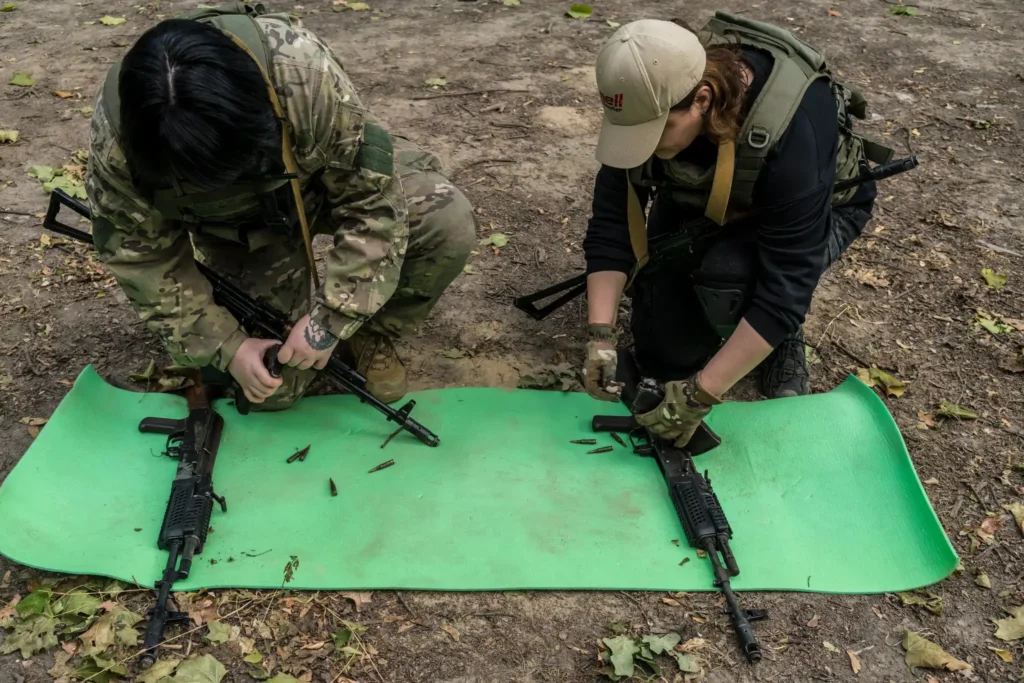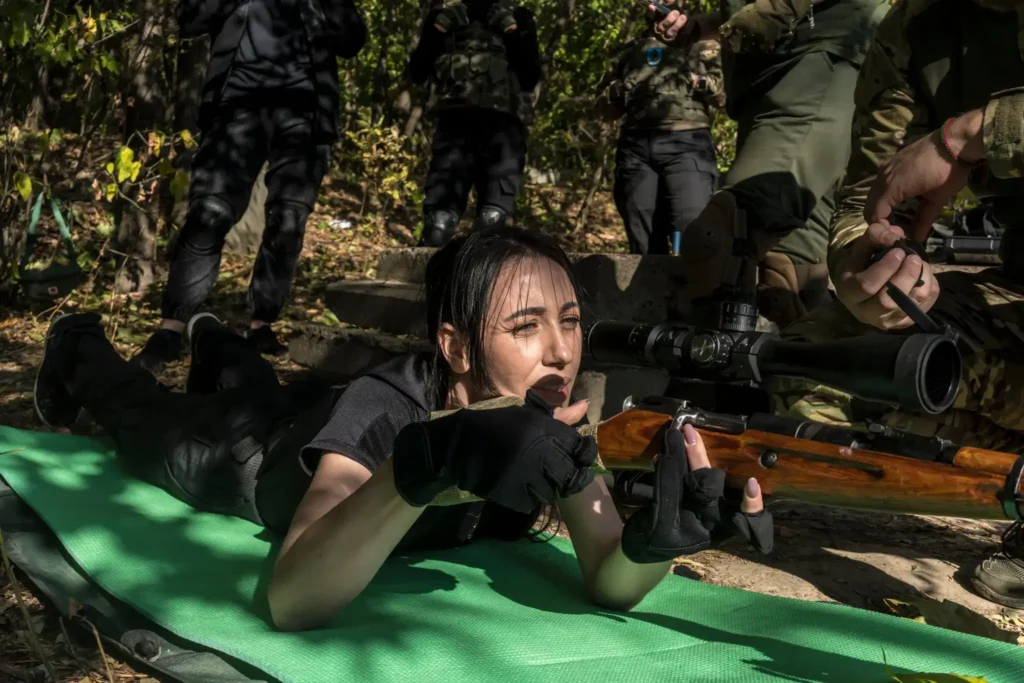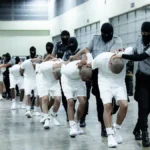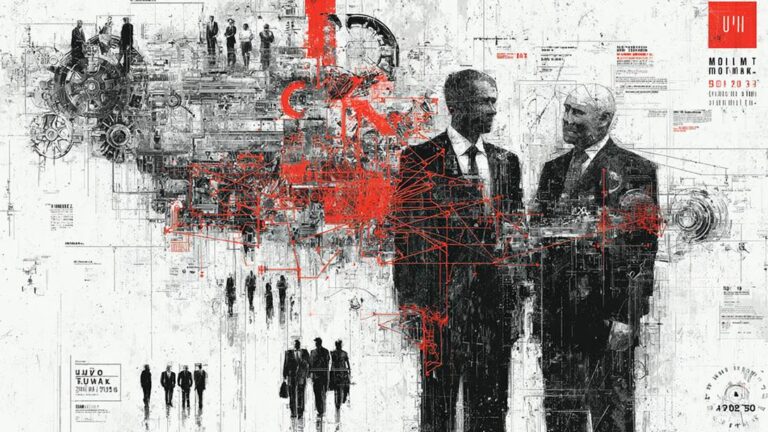Halyna Vynokur, a clerk in a hardware store in Kyiv, was shouldering a firearm for the first time. Iryna Sychova, a purchasing manager at a department store, disassembled and reassembled the jumble of rods and springs in a Kalashnikov rifle.
They were among two dozen women who turned out in a forest near Kyiv one recent weekend for a course in firearms and urban combat, training that included shooting rifles, finding booby traps and throwing hand grenades.
They were spurred by a sense of duty, they said, realizing they might some day end up on the front lines.
“Nobody wants to fight in the trenches,” said Olha Bakhmatova, 46, a psychologist who attended the training. “It’s unnatural to want it.”
But she felt it was “inevitable” that more women would wind up fighting, and she wanted to be prepared.
“Now, I understand: If not me, who?” she said.
After 20 months of full-scale war, the fighting in Ukraine has bogged down in vicious battles of attrition along a zigzag front line in the southeast.
A steady supply of weapons and personnel are crucial, and while Ukraine has the benefit of Western-donated armaments, it relies on only its own population as a pool for replenishing forces — and Russia’s is about three times as large.
With so much hinging on refilling the ranks, efforts are underway to draw more Ukrainian women into the army. Volunteer groups offering all-female training, like the one near Kyiv, are supporting the effort.
About 43,000 women now serve in the Ukrainian military, according to the ministry of defense, an increase of about 40 percent since 2021, the year before Russia’s full-scale invasion.
The proportional increase is less than the male fighting force, which has more than tripled over the same period.
Ukrainian women are fighting in combat in southeastern Ukraine now. In several steps since the invasion, the military abolished restrictions that kept women from roles such as machine gunner, tank commander and sniper, and lifted rules prohibiting women from driving trucks.
It raised the age limit for female recruits, previously 40, to 60, the same as for men.
Earlier in the full-scale war, women had taken combat roles in paramilitary groups or by skirting rules. And they have been wounded, captured and killed, though the military does not release casualty figures for either men or women.
The Ukrainian Army’s outreach to women is a step toward equality, to be sure, but one that also reflects the tremendous toll the war has exacted.
The hundreds of thousands of men who wanted to volunteer at the start of the war, many lining up on Day 1, have already joined; many are dead or wounded.
Ukraine now needs to mobilize and train many more soldiers to sustain its resistance to the Russian invasion, even as men are increasingly dodging the draft.
The all-female training sessions are aimed at providing a learning environment where the women would not feel less knowledgeable than men, and where their efforts would not continually be compared with male physical strength.
“Women are able to fight on an equal footing with men and at the same time remain feminine,” said Darya Trebukh, the founder of the nongovernmental group, Ukrainian Valkiriya, that is leading the training sessions.
“The gender of a warrior makes no difference.”

Ms. Vynokur, 26, the hardware store clerk, turned out for the training with a friend after seeing an advertisement on Instagram.
“What attracted me is this is only for women,” she said. “It’s more comfortable, especially for the first time” handling a weapon. “As women, we are all on the same level,” she said.
Of serving in the military, she said: “Everybody understands the war won’t be over in a month. I don’t want to, I never wanted to, but I understand I should be ready to.”
Ukraine’s military has focused primarily on ways to improve conditions for women already in the military, such as providing gender-specific clothing and body armor, and not on mobilization.
It does not draft women, though recently it has required that women with medical training register for the draft. Women who want to serve must enlist.
At the recent session near Kyiv, beginners learned to adjust the sling on a Kalashnikov rifle: Too loose and it bounces, too tight and it cannot quickly swing into position to fire.
The male instructor, an active-duty paratrooper, demonstrated reloading a magazine, clearing a jammed cartridge and firing from a prone position.
Instances of friction have become more common. In July, the police arrested officials in military recruitment offices for taking bribes of $250 to $1,500 from men to avoid the draft and President Volodymyr Zelensky fired all regional heads of draft offices over bribery concerns.
In August, the military cut back on deferments for chronic diseases. Now men with asymptomatic tuberculosis, hepatitis and H.I.V. are eligible for the draft.
In June, the military tightened exemptions for men caring for disabled relatives or studying at graduate schools, where enrollment has ballooned since the invasion.
To accommodate women, the ministry of defense introduced a female-specific uniform over the summer and this month the Ukrainian Army issued female underwear.
The first indication of a possible draft for women came into effect on Oct. 1, with a law requiring women with medical training to register at recruitment offices.
They are not being called up, but are required to undergo medical checkups and receive draft cards.
Women have been drawn in particular into piloting drones flown for surveillance or to drop explosives on the enemy.
“Women who can fly drones are people who could tomorrow, if needed, get a drone to target artillery fire,” said Valeriy Borovyk, a drone unit commander and founder of a group dedicated to training female pilots called Pilotesy.
Mr. Borovyk founded Pilotesy in Kyiv in the first month of the full-scale invasion while scrambling to find drone pilots. A fashion show organizer helped recruit, and some of the first students were models and actresses. About a third of these women have since joined the army, he said.

Women study combat drone piloting for a range of reasons, he said. Some think they may be called up to fight and want a useful skill. Others are already in the military and want to move from supporting positions or medical jobs to combat roles.
“I can be called up to the army so I decided that I should have some skills for the front line,” said Alina Budnyova, 24, who graduated from the medical university last year and is now required to register for the draft. She said she was motivated to prepare because “I want to protect my country.”
Ms. Budnyova was starting with basics: left and right turns, hovering, keeping the drone in line of sight of satellites for navigation. She flew carefully, low to the ground, buzzing over dry, brown autumn grass and flowers in a training field.
“Women often feel themselves second class,” in the military, said one of the drone trainers, Diana, who asked that only her first name be used for security reasons.
“They are physically weaker and there are things they cannot do.” But they are on equal footing in piloting drones. “I joined the army to fight, not shuffle papers,” she said.
The Valkiriya group has trained about 200 women in firearms and other combat skills.
Women who complete the course and wish to join the army sign up at recruitment offices; about one in five of the students have done so, Ms. Trebukh said.

Out in the forest, the all-female group trained for combat, some having an introductory lesson, others practicing advanced skills. The group makes a few nods to gender:
Some of the targets were pink balloons, and a car was parked nearby as a private space for changing into camouflage.
A few hours into the training, a group of half a dozen women, including Ms. Sychova, the purchasing manager, practiced assaulting a building.
CLICK HERE TO READ MORE FROM THE REPUBLICAN VOICE
They walked up stairwells, through corridors, around corners, covering one another, patting one another on the back, and keeping their weapons trained on possible threats. On an upper floor, a man playing an enemy waited.
When the lead group reached him, one woman yelled, “Contact!” The trainees pretended to shoot.
“Girls, that’s it,” Ms. Sychova yelled down a stairwell. “We killed him.”























